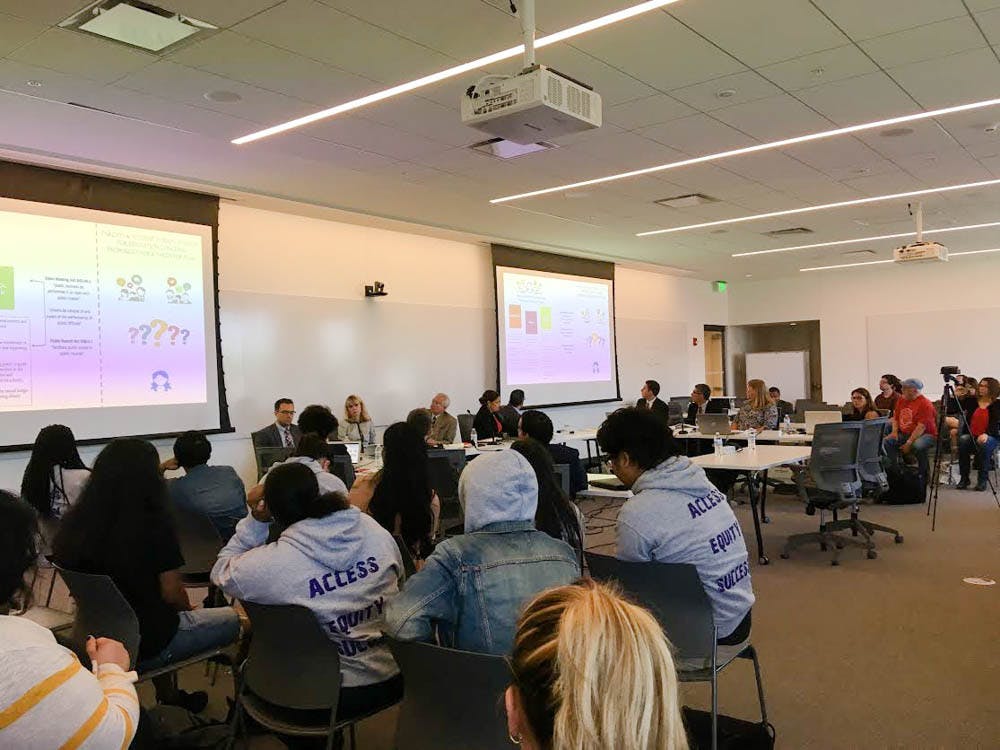Testimony at a standard legal hearing grew personal and searing Friday, when students, parents and community members packed into a room to advocate for a formal role in the upcoming R.I. state takeover of the Providence Public School District.
Just before the actual administrative hearing at the School of Professional Studies Friday and following hours of testimony, R.I. Commissioner of Education Angélica Infante-Green denied a motion by the R.I. Center for Justice to make parents, students and community members a legally official party in the state takeover. The Commissioner assured that community voices would be represented in the official shape of the state takeover, though she did not provide specifics.
The motion, supported by eight parents and 13 local students, called for community members to have equal legal say with the City Council, mayor, School Board and superintendent over the takeover. These four parties — excluding the community members — could have objected to the transfer of power by Sept. 4, but none did.
The Center for Justice structured its legal argument for the motion around three core components. They argued that the local community holds a very direct stake in the state takeover; failure to include community organizations will harm the community; and community inclusion is a condition for a successful state takover.
Those who testified described their motion as a request for a “seat at the table”— an official opportunity for community influence over the shape of the state takeover.
“These Providence Public School families and organizations are asking you to approve their motion to be acknowledged as equal partners to the other parties named in the show-cause hearing,” said R.I. Center for Justice Director Jennifer Wood ’81 P’15. “They don’t see themselves reflected in the proposed order in a way that preserves their legal access to the decisions that get made at education and policy centers.”
The motion does not oppose the state takeover of the PPSD, Wood said when she introduced the testimonies. “The parents and students and student organizations who are here this morning are here to support the success of your takeover of the Providence Public Schools,” she said.
Chanda Womack of the Alliance of Rhode Island Southeast Asians for Education expressed her personal support for the Commissioner. “I personally was extremely excited being that you were a woman of color, and I know the struggles that being a woman and a woman of color face in leadership positions, so I think we’re past wanting you to succeed — we need you to succeed,” she said.
But she defended the importance of direct community representation in the takeover’s decision-making. “It can’t be engagement. It can’t be community forums. It has to be, ‘please come to the table and help create the state takeover plan,’” she said, slamming the table for emphasis.
In their testimonies, community leaders described years of asking for change without being heard and expressed the heightened need for a more official role in the upcoming takeover.
“I’ve seen over and over the ways that students can be encouraged to participate in systems but not have actual legal mechanisms to do so,” said Zackary Mezera, co-founder of the Providence Student Union, as one of the witnesses for the Center for Justice. “So I don’t know how many community forums I’ve been to, public hearings, things where students’ opinions are taken down on whiteboards or on butcher paper. And then those papers are folded … and they go in a desk and disappear.”
The Commissioner and lawyers asked the crowd repeatedly not to voice support for one side or the other in the hearing to maintain a professional environment, but snaps and applause broke through often.
It is “pretty unique” for all of the people involved in this process to collectively recognize the need for a state takeover of a city district, said Domingo Morel, Annenberg affiliate researcher at Brown and assistant professor of political science at Rutgers University, whose research focuses on state takeovers. Given the rarity of such widespread community support, the official legal actors should incorporate the community into the process, he added.
When she rejected the motion, the Commissioner made clear that she wanted community voices included in the process in some way. “Any turnaround plan will provide the proposed interveners and others with more involvement with and visibility into the governance of the Providence school district — more than they presently have,” she said. Any community role must include the schools’ constituents as a whole, rather than specific groups or individuals, she added.
Legal hearings like Friday’s are not usually public, but the Commissioner wanted to give community members a chance to testify. She ruled not to include community members as a fifth party on legal grounds, but said that community members will have an official role. “This is not haphazard.”
Once the motion was denied, many community members left the room while the procedural hearing, called a “show-cause administrative hearing,” took place. The hearing itself did not serve a decision-making purpose and was conducted as a formality.
Following the rejection of the motion, lawyers on both sides testified for the necessity of the takeover. They emphasized the gravity of the devastating school report conducted by Johns Hopkins. In addition, three city councilwomen advocated for a greater community role in the takeover, reiterating the ideas of petitioners.
The order describing the shape of the state takeover can be expected in the next few weeks, the Commissioner told The Herald.





